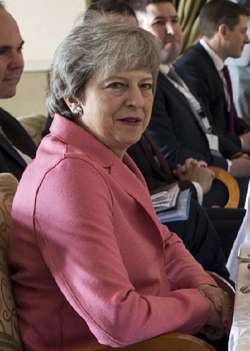Pressure mounts on Theresa May to delay Brexit deadline
British Prime Minister Theresa May has come under increasing pressure to delay the March 29 deadline for Britain's exit from the European Union as the prospect of a withdrawal agreement being passed by the UK Parliament continues to hang in the balance.

British Prime Minister Theresa May has come under increasing pressure to delay the March 29 deadline for Britain's exit from the European Union as the prospect of a withdrawal agreement being passed by the UK Parliament continues to hang in the balance.
From an Arab-EU summit in Egypt on Monday, prime minister May insisted the UK was on course to acquire the legally binding assurances that the House of Commons needs in relation to the controversial Irish backstop clause to pass such a deal.
However, she sought more time to put it to a so-called "meaningful vote" in Parliament, which will now take place on March 12 instead of this week as previously announced.
"There is still more work to do, and my team will be in Brussels tomorrow (Tuesday) working on the legally binding assurances that the UK Parliament needs in relation to the backstop," she said in a statement from the Egyptian resort town of Sharm el-Sheikh.
"But what I have sensed in all of my conversations with my fellow leaders, both here in Sharm el-Sheikh and in recent days, there is a real determination to find a way through which allows the UK to leave the EU in a smooth and orderly way with a deal," she said.
But with another delay of the vote to next week, just 17 days before the March 29 deadline, MPs from within her own Conservative Party are beginning to speak out in favour of postponing the timeline at least by a few months.
It is being suggested as an alternative to cross-party proposals which would see MPs take control of the process, with British MPs set to table a series of amendments on the future course of Brexit on Wednesday.
One, drawn up by Labour's Yvette Cooper and Conservative Oliver Letwin, would, if passed, give MPs the power to demand a delay to Brexit if a deal cannot be agreed by March 13.
There is also a proposal for a new amendment from a group of Tory backbenchers, led by Andrew Percy and Simon Hart, which calls for a "strictly time limited" delay to Brexit if there is no formal deal by March 13.
Three Cabinet ministers - Greg Clark, Amber Rudd and David Gauke - have indicated plans to defy the government whip and vote in favour of one such amendment in favour of a delay unless there is a major breakthrough in ongoing talks with the EU to avert a chaotic no-deal.
May has refused to comment on whether she would be forced to sack ministers from her Cabinet in such a scenario.
Meanwhile, the President of the European Council Donald Tusk said he had also discussed a "potential extension" to Article 50 when he met prime minister May on Monday and that the EU side was open to that option as opposed to crashing out with no deal.
"We will face an alternative, chaotic Brexit or an extension. The less time there is until 29 March, the greater the likelihood of an extension, and this is an objective fact - not our intention, not our plan, but an objective fact," Tusk said.
He said an extension would be a "rational solution" but that May told him "she still believes she is able to avoid this scenario".
The British Prime Mnister has long resisted any suggestion that the UK's departure could be postponed beyond March 29, the two-year timeline under the Article 50 process set for a country's departure from the EU.
Opposition Labour Party leader Jeremy Corbyn has been criticising her government for "running down the clock" until a time when MPs were forced "to choose between her bad deal and a disastrous no deal".
His party is likely to table an amendment on Wednesday, putting its own Brexit plan – one which backs a permanent Customs Union with the EU and a close relationship with its single market – to MPs.
That move could take the party a step closer to supporting a second EU referendum, calls for which has been growing since nine members of the party quit openly backing another referendum.
There will be further talks in Brussels on Tuesday on the Northern Ireland backstop – the number one sticking point for many when it comes to a Brexit deal clearing Parliament.
The clause is intended as an insurance policy to ensure an open border between EU member-state Ireland and the UK after Brexit but hard-Brexiteers fear it could be used by the economic bloc to keep Britain tied to EU rules indefinitely.
The same group is also against any delay in the exit deadline next month.